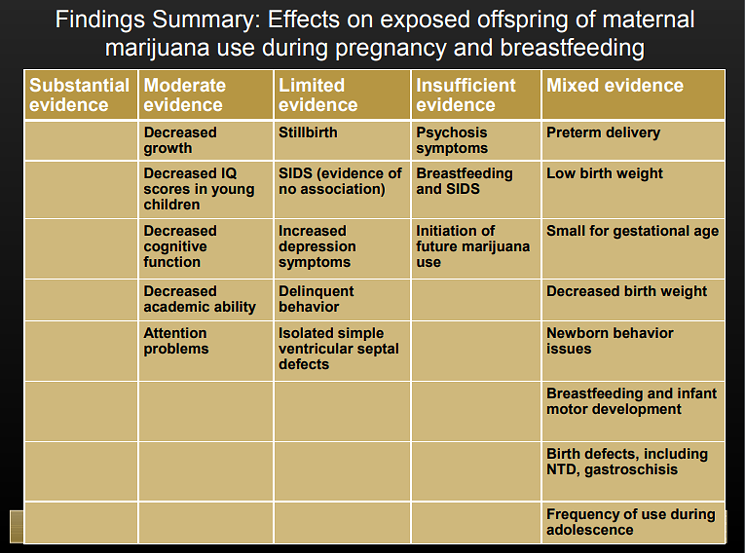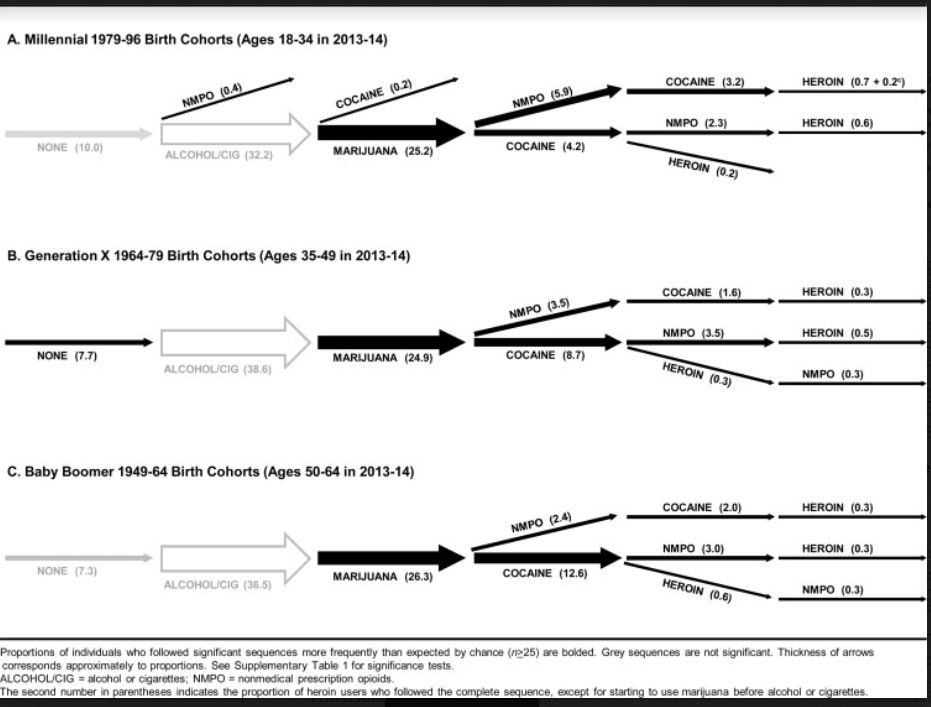study
Current sort has key articles at the top. Click on "Article Date" to sort by date, click on specific "tag" to view all articles in that category.
| Title/Link | |
|---|---|
|
Subchronic toxicity of cannabis leaves on male albino rats 12/02/2023 |
Abstract Cannabis is the most commonly abused drug in the world. In Egypt, the Anti Narcotic General Administration showed that the narcotics problem costs the Egyptian economy approximately 800 million dollars annually. LD50, lethal dose that kills 50% of the treated animals, of the bango was determined and then selected groups of rats were given tenth of LD50 for 90 days. study, Research, rats |
|
CANNABIS: DRUG OF ABUSE AND THERAPEUTIC AGENT, TWO SIDES OF THE SAME COIN 05/27/2023 |
The evidence presented in this review allows us to conclude that Δ9-THC and CBD produce biphasic, dose-dependent effects on several physiological responses. The biphasic nature of cannabinoid effects highlights the need for a careful analysis of the dose ranges separating therapeutic from unwanted effects. Besides, Δ9-THC produces dependence and harmful effects, while CBD does not. Potency, study, Research, THC levels |
|
Intensity of cannabis use: Findings from three online surveys 01/17/2023 |
study |
|
Cannabis For Pain Relief? Review of 20 Studies Provides Sobering Results 12/01/2022 |
There are numerous examples of the relationship between treatment expectations and placebo responses. If a person thinks they will experience relief from their pain by using a certain product or treatment, this can change the way they end up perceiving incoming pain signals – making them think their pain is less severe. Recent evidence suggests that the placebo effect may work even if we're presented with evidence that contradicts our initial expectations. study, Placebo, sciencealert |
|
Association of Mental Health Burden With Prenatal Cannabis Exposure From Childhood to Early Adolescence: Longitudinal Findings From the Adolescent Brain Cognitive Development (ABCD) Study 12/01/2022 |
Conclusions and relevance: This study suggests that prenatal cannabis exposure and its correlated factors are associated with greater risk for psychopathology during middle childhood. Cannabis use during pregnancy should be discouraged. prenatal, Pregnancy, mental health, study, Research, 2023 Presentation Dr Berry |
|
Sperm DNA methylation alterations from cannabis extract exposure are evident in offspring 11/20/2022 |
Conclusions: This is the first characterization of the effect of cannabis exposure on the entirety of the rat sperm methylome. We identified CE-associated methylation changes across the sperm methylome, some of which persisted despite a "washout" period. Select methylation changes validated via bisulfite pyrosequencing, and genes associated with methylation changes were involved in early developmental processes. Preconception CE exposure is associated with detectable changes in offspring DNA methylation that are functionally related to changes in gene expression and cardiomegaly. These results support that paternal preconception exposure to cannabis can influence offspring outcomes. study, Research, rats, offspring, heredity, 2023 Presentation Dr Berry |
|
Placebo Response and Media Attention in Randomized Clinical Trials Assessing Cannabis-Based Therapies for Pain 11/16/2022 |
Findings This meta-analysis of 20 studies of 1459 individuals found a significant pain reduction in response to placebo in cannabinoid randomized clinical trials. Media attention was proportionally high, with a strong positive bias, yet not associated with the clinical outcomes. Placebo, meta-analysis, JAMA, 2023 Presentation Dr Berry, study, Research |
|
What is Delta-8? Cleveland Clinic 06/26/2022 |
Like CBD, delta-8 (delta-8 tetrahydrocannabinol) is just one of more than 100 chemical compounds found in the cannabis sativa plant. Most people are familiar with THC (delta-9 tetrahydrocannabinol), the main psychoactive compound in cannabis that gives you a euphoric high. Delta-8, study |
|
Delta-8 THC use in US adults: Sociodemographic characteristics and correlates 06/13/2022 |
 Conclusions Delta-8, study |
|
Associations of Cannabis Use across Adolescence and Early Adulthood With Health and Psychosocial Adjustment 06/13/2022 |
Associations of Cannabis Use across Adolescence and Early Adulthood With Health and Psychosocial Adjustment in Early Adulthood and Midadulthood in Men cannabis-induced psychosis, men, young adults, study, PubMed |
|
Marijuana for medical use may result in rapid onset of cannabis use disorder 03/24/2022 |
CUD, 'medicine', study |
|
Cannabis use may be associated with suicidality in young adults 06/01/2021 |
An analysis of survey data from more than 280,000 young adults ages 18-35 showed that cannabis (marijuana) use was associated with increased risks of thoughts of suicide (suicidal ideation), suicide plan, and suicide attempt. These associations remained regardless of whether someone was also experiencing depression, and the risks were greater for women than for men. youth, suicide, NIH, study, Research |
|
Largest brain study of 62,454 scans identifies drivers of brain aging 05/01/2019 |
The study found that a number of brain disorders and behaviors predicted accelerated aging, especially schizophrenia, which showed an average of 4 years of premature aging, cannabis abuse (2.8 years of accelerated aging), bipolar disorder (1.6 years accelerated aging), ADHD (1.4 years accelerated aging) and alcohol abuse (0.6 years accelerated aging). Interestingly, the researchers did not observe accelerated aging in depression and aging, which they hypothesize may be due to different types of brain patterns for these disorders. study, Brain, aging, science daily |
|
cannabis use to variation in the incidence of psychotic disorder across Europe 03/19/2019 |
In conclusion, our findings confirm previous evidence of the harmful effect on mental health of daily use of cannabis, especially of high-potency types. Importantly, they indicate for the first time how cannabis use affects the incidence of psychotic disorder. Therefore, it is of public health importance to acknowledge alongside the potential medicinal properties of some cannabis constituents the potential adverse effects that are associated with daily cannabis use, especially of high-potency varieties. Research, study, Lancet, Potency, Psychosis, cannabis-induced psychosis |
|
Daily Marijuana Use And Highly Potent Weed Linked To Psychosis 03/19/2019 |
The study authors consider high-potency cannabis to be products with more than 10 percent tetrahydrocannabinol or THC, the compound responsible for the drug's psychoactive effects. The fact that consuming high-THC cannabis products has a greater risk is concerning, Lisdahl says, because these products are more common in the market now. Now a new study published Tuesday in the The Lancet Psychiatry shows that consuming pot on a daily basis and especially using high-potency cannabis increases the odds of having a psychotic episode later. study, Potency, Lancet, Psychosis |
|
Children of mothers 09/24/2018 |
When mothers use marijuana during the first 12 years of their child's life, their cannabis-using children are more likely to start at an earlier age than children of non-using mothers, according to a new study from the Harvard T.H. Chan School of Public Health published in the American Journal of Preventive Medicine. This study is the first to establish a relationship between maternal cannabis use during a child's lifetime and earlier initiation in a nationally-representative, longitudinal cohort and examine the role of race, gender, and other social environmental factors. Children, parents, study |
|
4-year prospective cohort study 09/13/2018 |
In conclusion, cannabis use is common in people with chronic non-cancer pain who have been prescribed opioids, and interest in medicinal use of cannabis is increasing. We found no evidence that cannabis use improved patient outcomes; those who used cannabis had greater pain and lower self-efficacy in managing pain. Furthermore, we found no evidence that cannabis use reduced pain interference or exerted an opioidsparing effect. Lancet, study, pain |
|
Cannabis use and driving-related performance 07/01/2018 |
We found that among young recreational cannabis users, a regular dose of cannabis had no effect on simple and learned tasks, but its use led to significant impairments on complex and novel driving-related tasks, as well as perceived driving ability and safety, for up to 5 hours after use. The present finding that the first 5 hours after cannabis use affected driving-related performance substantiates the recommendations of Canada’s Lower-Risk Cannabis Use Guidelines, which recommend waiting 6 hours after cannabis use before driving.30 Canada, Research, study, driving, youth |
|
Study shows prenatal cannabis use associated with low birth weights 04/23/2018 |
Pregnancy, study |
|
Medical Marijuana Users are More Likely to Use Prescription Drugs Medically and Nonmedically 04/17/2018 |
Conclusions: Our findings disconfirm the hypothesis that a population-level negative correlation between medical marijuana use and prescription drug harms occurs because medical marijuana users are less likely to use prescription drugs, either medically or nonmedically. Medical marijuana users should be a target population in efforts to combat nonmedical prescription drug use. opioid, study, Research |
|
Pathway to Heroin 03/03/2018 |
heroin, addiction, study |
|
Cryptococcal meningitis in a daily cannabis smoker without evidence of immunodeficiency. 01/31/2018 |
Cryptococcal meningitis in a daily cannabis smoker without evidence of immunodeficiency. Cryptococcal meningitis, chronic, study, PubMed |
|
Systematic review of safeness and therapeutic efficacy of cannabis 11/16/2017 |
there is incomplete evidence of the efficacy and safety of medical use of cannabis in the clinical contexts considered in this review. Furthermore, for many of the outcomes considered, the confidence in the estimate of the effect was again low or very low. To give conclusive answers to the efficacy and safety of cannabis used for medical purposes in the clinical contexts considered, further studies are needed, with higher quality, larger sample sizes, and possibly using the same diagnostic tools for evaluating outcomes of interest. study, 'medicine', MS, Chemo |
|
Secondhand Pot Smoke Just As Bad For Heart As Tobacco 08/21/2017 |
The main finding was that when rats were exposed to secondhand smoke from marijuana for one minute, their arteries became less efficient at carrying enough blood for at least 90 minutes, whereas similar exposure to secondhand smoke from tobacco caused impairment that fully recovered within 30 minutes (exposure to clean air in the exposure chamber did not cause impairment). (It is important to understand that arteries of rats and humans are similar in how they respond to tobacco smoke, so the response of rat arteries to marijuana smoke is expected to be a valid indication of how human arteries respond to marijuana smoke.) study, second hand smoke |
|
Benefits and Harms of Cannabis in Chronic Pain or Post-traumatic Stress Disorder: A Systematic Review 08/01/2017 |
"We found no observational studies that met inclusion criteria, but a growing body of cross-sectional literature suggests negative opioid-related correlates among individuals who use cannabis and opioids concurrently. These include opioid misuse;9,10,99,133 a greater number of opioid refills;99 a longer duration of opioid use; a higher dose of opioid medication prescribed;9 and endorsement of using opioids and other pain medications without a prescription.134" Veterans, opioid, study |
|
Cognitive control in young adults with cannabis use disorder: An event-related brain potential study. 07/26/2017 |
Abstract Contemporary models of substance use disorders emphasize the role of cognitive control, which has been linked to difficulties in resisting the use of substances. In the present study, we measured two aspects of cognitive control, response inhibition (operationalized by a Go/NoGo Task) and performance monitoring (operationalized by an Eriksen Flanker Task), in a group of young cannabis-use disorder (CUD) patients and compared these functions with two control groups (i.e. a group of cigarette smokers and a group of non-smokers). We employed both behavioural and electrophysiological measures. The results indicate that CUD patients displayed reduced NoGo-P3 event-related potentials compared with non-smoking controls, but not compared with smoking controls. In addition, CUD patients were slower on Go trials than both control groups. No other between-group electrophysiological or behavioural differences were observed. These results seem to suggest that CUD patients have problems related to response inhibition, but performance monitoring seems relatively unaffected.
CUD, Cannabis-use disorder, study |
|
School Of Public Health Study Finds Use Of Marijuana Increases Risk Of Metabolic Syndrome School Of Public Health Study Finds Use Of Marijuana Increases Risk Of Metabolic Syndrome 06/29/2017 |
“Duration of marijuana use seems to be a significant factor associated with metabolic syndrome,” the researchers said. study, Georgia State University, Metabolic Syndrome |
|
Patterns of cannabis use during adolescence and their association with harmful substance use behaviour: findings from a UK birth cohort 06/07/2017 |
Conclusions One-fifth of the adolescents in our sample followed a pattern of occasional or regular cannabis use, and these young people were more likely to progress to harmful substance use behaviors in early adulthood. study, longitudinal, PubMed |
|
Teen Pot Use Linked to Illegal Drug Use by Age 21, Study Suggests 06/07/2017 |
In the new study, researchers analyzed data from the Avon Longitudinal Study of Parents and Children, a long-running study in the U.K. that has followed women and their children. The study began when the women were first pregnant, all in 1991 or 1992. study, longitudinal, UK, gateway |
|
Medical marijuana: Fungal, bacterial contaminants found, dangerous for immunocompromised patients 02/27/2017 |
UC Davis physician researchers have found that medical marijuana contains multiple bacterial and fungal pathogens that may cause serious and even fatal infections. They warn that smoking, vaping or inhaling aerosolized marijuana could pose a grave risk to patients, especially those with leukemia, lymphoma, AIDS or conditions requiring immune-suppressing therapies. contaminated, UC Davis, study |
|
Health Effects of Marijuana and Cannabis 01/20/2017 |
The evidence reviewed by the committee suggests that cannabis use is likely to increase the risk of developing schizophrenia, other psychoses, and social anxiety disorders, and to a lesser extent depression. Heavy cannabis users are more likely to report thoughts of suicide than non-users, and in individuals with bipolar disorder, near-daily cannabis users show increased symptoms of the disorder than non-users. mental health, smoking, study, science engineering medicine, 2019 legislation |
|
Association of Cannabis Use in Adolescence and Risk of Depression, Anxiety, and Suicidality in Young Adulthood 02/16/2010 |
Conclusions and Relevance Although individual-level risk remains moderate to low and results from this study should be confirmed in future adequately powered prospective studies, the high prevalence of adolescents consuming cannabis generates a large number of young people who could develop depression and suicidality attributable to cannabis. This is an important public health problem and concern, which should be properly addressed by health care policy. anxiety, depression, suicide, study, meta-analysis, Research, 2023 Presentation Dr Berry |



